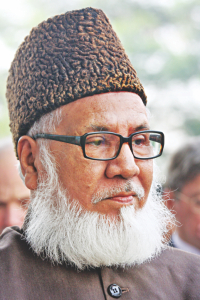
Back مطيع الرحمن نظامي Arabic মতিউর রহমান নিজামী Bengali/Bangla Motiur Rahman Nizami German مطیع الرحمان نظامی Persian Motiur Rahman Nizami Finnish Motiur Rahman Nizami French मोतीउर रहमान निज़ामी Hindi Motiur Rahman Nizami ID മുതീഉർറഹ്മാൻ നിസാമി Malayalam Motiur Rahman Nizami Dutch
Motiur Rahman Nizami | |
|---|---|
 Nizami | |
| Leader of Jamaat-e-Islami | |
| In office 6 March 2001 – 11 May 2016 | |
| Preceded by | Professor Ghulam Azam |
| Succeeded by | Maqbul Ahmed |
| Minister of Agriculture | |
| In office 10 October 2001 – 22 May 2003 | |
| President | |
| Prime Minister | Khaleda Zia |
| Succeeded by | M. K. Anwar |
| Minister of Industries | |
| In office 22 May 2003 – 28 October 2006 | |
| President | |
| Prime Minister | Khaleda Zia |
| Preceded by | M. K. Anwar |
| Succeeded by | Dilip Barua |
| Member of Parliament for Pabna-1 | |
| In office 1 October 2001 – 28 October 2006 | |
| Preceded by | Abu Sayeed |
| Succeeded by | Shamsul Hoque Tuku |
| Majority | 135,982 (57.68%) |
| In office 27 February 1991 – 16 February 1996 | |
| Preceded by | Manzur Quader |
| Succeeded by | Abu Sayeed |
| Majority | 55,707 (36.85%) |
| Personal details | |
| Born | 31 March 1943 Santhia Upazila, Pabna, Bengal Presidency, British India |
| Died | 11 May 2016 (aged 73) Old Dhaka Central Jail, Dhaka, Bangladesh |
| Cause of death | Execution by hanging |
| Political party | Jamaat-e-Islami |
| Spouse | Shamsunnahar Nizami |
| Children | 1[1][2] |
| Alma mater | University of Dhaka |
| Profession | Politician, scholar |
Motiur Rahman Nizami (Bengali: মতিউর রহমান নিজামী; 31 March 1943 – 11 May 2016)[3][4] was a politician, former Minister of Bangladesh, Islamic scholar, writer, and the former leader of the Bangladesh Jamaat-e-Islami. He is noted for leading the terror squad Al-Badr during the Bangladesh Liberation War.[5] On 29 October 2014, he was convicted of masterminding the Demra massacre by the International Crimes Tribunal of Bangladesh.[6] Nizami was the Member of Parliament for the Pabna-1 constituency from 1991 to 1996 and again from 2001 to 2006.[3] He also served as the Bangladeshi Minister of Agriculture and Minister of Industry.
While various political entities and international organizations[7] had originally welcomed the trials,[8][9][10] in November 2011 Human Rights Watch criticized the government for aspects of their progress, lack of transparency, and reported harassment of defense lawyers and witnesses representing the accused.[11][12][13] Nizami was the last high-profile suspect to be tried for war crimes of the 1971 Bangladesh Genocide; the court delayed his verdict in June 2014 because of the state of his health.[14]
In 2004, Nizami was convicted under separate charges for arms trafficking to the state of Assam, India and was sentenced to death, along with 13 other men in January 2014.[15]
On 29 October 2014, he was convicted and sentenced to death for his role in masterminding the Demra massacre, in which 800–900 unarmed Hindu civilians were killed after the women were raped. He was executed by hanging at Dhaka Central Jail on 11 May 2016.[16] He is the third minister of Bangladesh to be hanged.[17] He was frequently listed on The 500 Most Influential Muslims.[18][19]
- ^ "Mohammad Nakibur Rahman". American Islamic Economic and Finance Institute.
- ^ "Interview with Nizami's son Nakibur Rehman on his father's execution". YouTube.
- ^ a b Mohiuddin Faruq (5 May 2016). "Noose tightens on Nizami for war crimes as Bangladesh Jamaat chief loses last legal battle". bdnews24.com. Retrieved 5 May 2016.
- ^ "Bangladesh hangs Jamaat-e-Islami chief Nizami for 1971 war crimes to protect Pakistan". bdnews24.com. 11 May 2016. Retrieved 11 May 2016.
- ^ Karlekar, Hiranmay (2005). Bangladesh: The Next Afghanistan?. Sage. p. 152. ISBN 978-0761934011.
- ^ Cite error: The named reference
bbc29Oct2014was invoked but never defined (see the help page). - ^ "EU supports war crime trial, wants fairness". The Daily Star. UNB. 28 May 2009. Archived from the original on 17 December 2013. Retrieved 26 July 2013.
- ^ Adams, Brad (18 May 2011). "Letter to the Bangladesh Prime Minister regarding the International Crimes (Tribunals) Act". Human Rights Watch.
- ^ Ullah, Ansar Ahmed (3 February 2012). "Vote of trust for war trial". The Daily Star.
- ^ Haq, M. Zahurul (2011). "Correspondents' Reports: Bangladesh". In M.N. Schmitt; Louise Arimatsu; T. McCormack (eds.). Yearbook of International Humanitarian Law - 2010. Springer. p. 463. ISBN 978-90-6704-810-1.
- ^ "Bangladesh: Stop Harassment of Defense at War Tribunal". Human Rights Watch. 2 November 2011.
- ^ Karim, Bianca; Tirza Theunissen (2011). Dinah Shelton (ed.). International Law and Domestic Legal Systems: Incorporation, Transformation, and persuasion. Oxford University Press. p. 114. ISBN 978-0199694907.
- ^ Ghafour, Abdul (31 October 2012). "International community urged to stop 'summary executions' in Bangladesh". Arab News.
- ^ "Bangladesh war crimes: verdict on Jamaat-e- Islami chief Motiur Rahman Nizami deferred", DNA India, 24 June 2014
- ^ "Bangladesh Islamist leader Motiur Rahman Nizami to hang". BBC News. 30 January 2014. Retrieved 5 October 2014.
- ^ "Nizami executed". Prothom Alo. Archived from the original on 11 May 2016. Retrieved 10 May 2016.
- ^ "Bangladesh hangs Jamaat-e-Islami chief Nizami for 1971 war crimes". bdnews24.com. 29 October 2014. Retrieved 10 May 2016.
- ^ Schleifer, S. Abdallah (ed.). The Muslim 500: The World's 500 Most Influential Muslims, 2013/14 (PDF). Amman: Royal Islamic Strategic Studies Centre. p. 145. ISBN 978-9957-428-37-2. Retrieved 13 September 2014.
- ^ S Abdallah Schleifer. "The Muslim 500 : The World's 500 Most Influential Muslims" (PDF). The Muslim 500. Archived from the original (PDF) on 26 January 2016. Retrieved 10 May 2016.